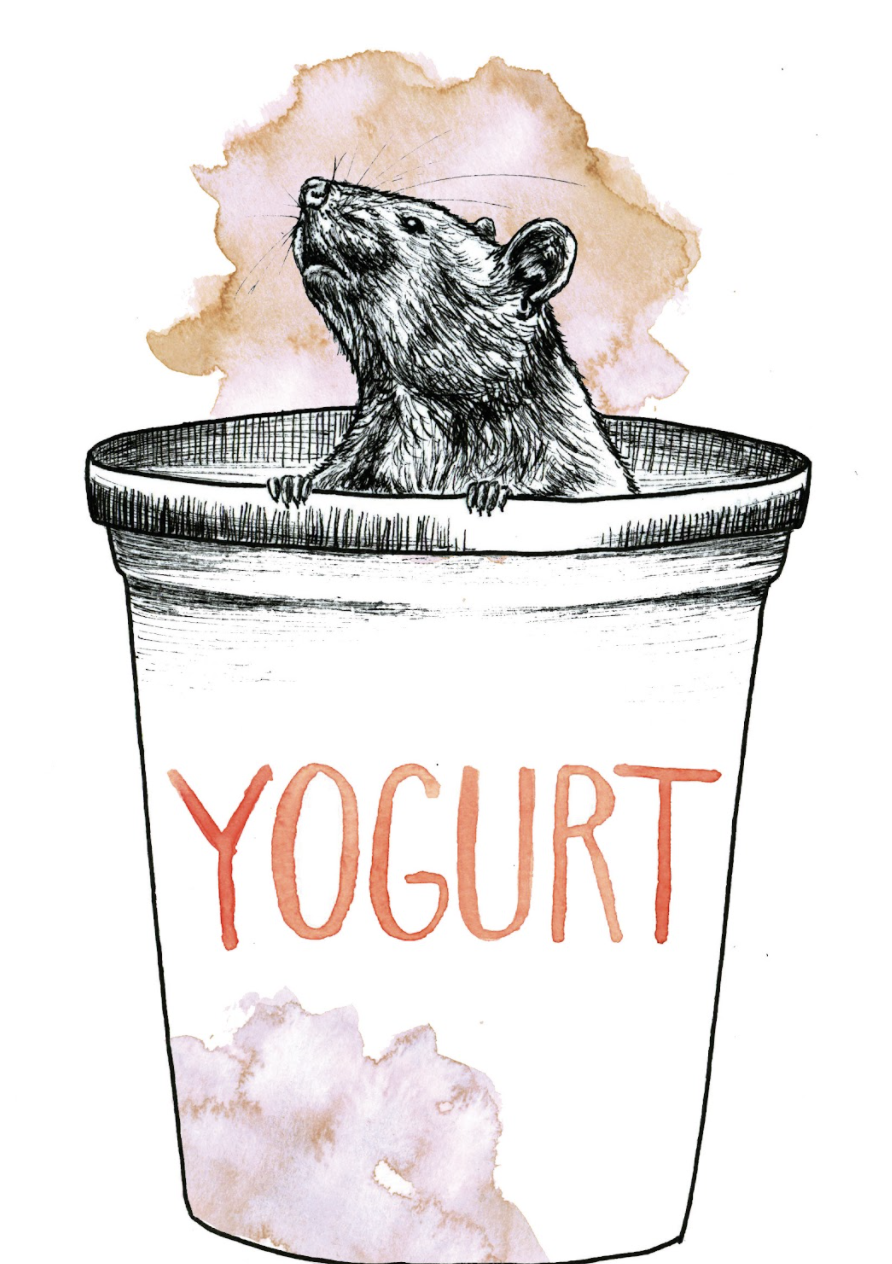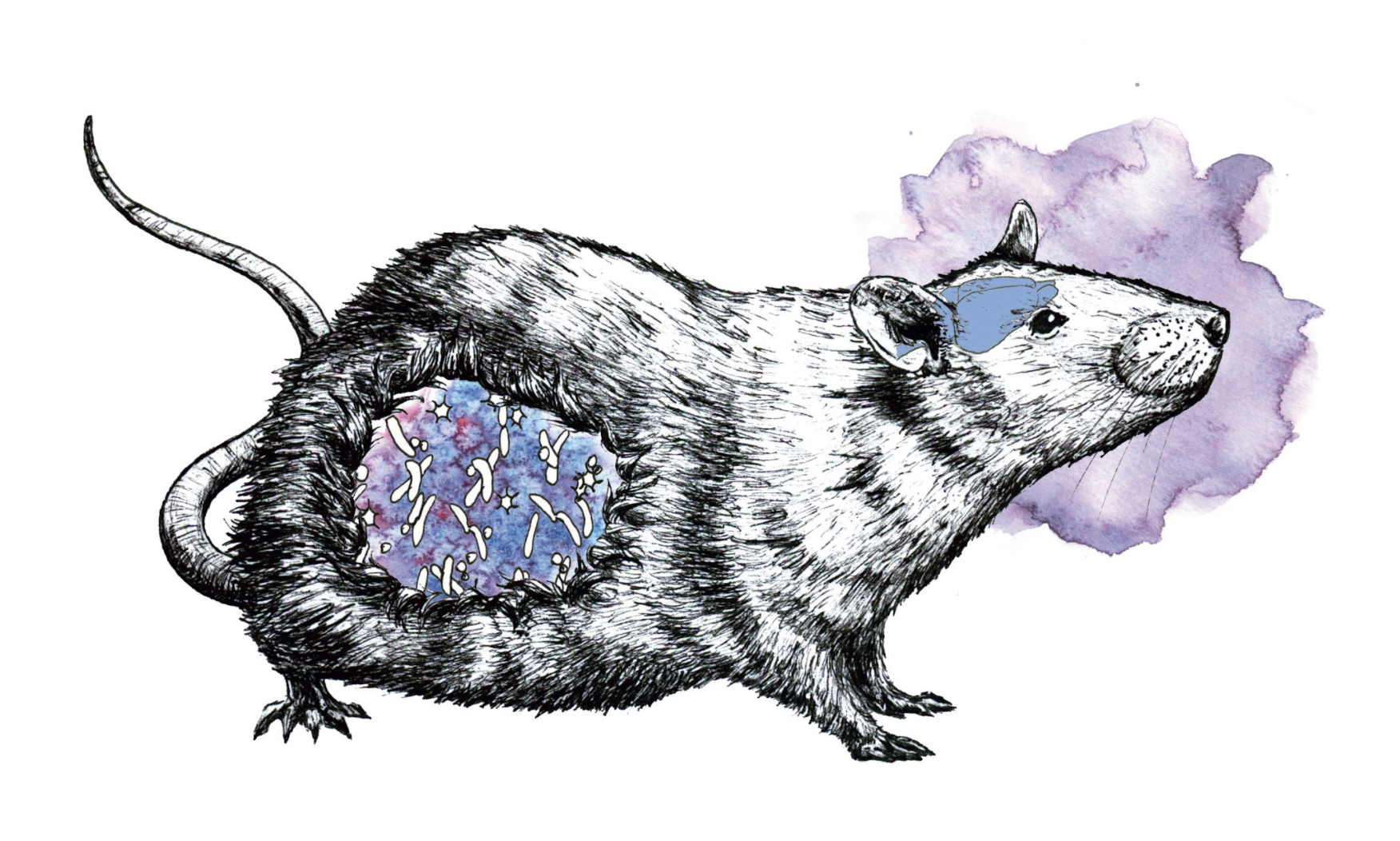Microbiome research is taking neurobiology to an unexpected place: the gut. Recent research has demonstrated a link between the microorganisms that live in the stomach and seemingly unrelated conditions like anxiety, depression, and even Autism Spectrum Disorders (ASD) [1][2]. Although this connection is relatively new, with most of the research published in 2004 or sooner, the neuroscience community is taking note. It is still unknown exactly how microbes affect the brain, and current research aims to find the exact mechanism that powers this relationship. With ten to one hundred times more bacteria in the gut than cells in the entire human body, there are many opportunities for microbes to affect human health [3].
How Bacteria Can Impact Stress
Microbiome research first examined neurological correlations in 2004 with a paper published by Sudo et al., which demonstrated a clear link between microbes and the neuroendocrine system. It was already well known that the Hypothalamic-pituitary-adrenal (HPA) axis (a neuroendocrine system that controls stress and other bodily functions) is sensitive to environmental influences during early life, so Sudo et al. hypothesized that the microbiome may be one environmental factor that plays a role in development of the HPA axis. The study tested three different types of genetically identical mice: germ-free (or GF) mice, which were never exposed to any type of microorganism; specific pathogen free (or SPF) mice, which were exposed to normal levels of microbiota but not specific pathogens; and gnotobiotic mice, which were only exposed to one bacterium. Researchers subjected all three types of mice to one hour of restraint stress, then tested them for two stress hormones related to the HPA axis (adrenocorticotropic hormone and corticosterone). They found that germ-free mice had higher levels of stress hormones when compared to SPF mice (Figure 1, Sudo et al). When the researchers inoculated the bacterial strain Bifidobacterium infantis in the germ-free mice, they saw a decrease in their stress hormone levels-- indicating that this bacteria strain may help lower stress levels. Later, Sudo et al decided to reconstitute feces from SPF mice in germ-free mice. They wanted to test whether giving the Germ-free mice gut flora similar to that of SPF mice could potentially change their stress levels. Their results showed that after being fed feces from SPF mice, the stress hormone levels in the GF mice more closely matched the stress hormone levels found in SPF mice (Figure 6, Sudo et al). However, this result was only found if the feces were given at a very young age. When the feces were added after a certain point in development, this reduction in stress hormones was no longer seen. This suggests that the microbiome does in fact play a role in the early development of the HPA axis [3].
Autism Spectrum Disorder
The idea that microbes could change stress hormone levels was a completely new finding which then sparked the interest of many other researchers. Hsiao et al., for example, decided to take a different approach to this same hypothesis. Using the findings from previous microbiome research on bowel symptoms, they decided to research the effects of the microbiome on Autism Spectrum Disorders (ASD). Individuals with ASD tend to have bowel-related symptoms, such as leaky gut and irritable bowel syndrome, so Hsiao et al. hoped to extend previous bowel and microbiome findings to ASD in particular. They used Maternal Immune Activation (MIA) mice, whose offspring are known to exhibit behaviors characteristic of ASD, and have been shown to experience bowel-related symptoms. They then added B. fragilis to the MIA offspring at a young age and performed behavioral and gut microbe composition tests. The researchers found that after administration of B. fragilis, many of the ASD-typical behaviors were not present in these mice, although they still displayed an inhibited social preference. This shows that the addition of B. fragilis to MIA offspring can actually diminish many of the symptoms of ASD. Hsiao et al. also showed that the MIA offspring with B. fragilis had very different colonies of bacteria in their microbiome, showing that addition of just one type of bacteria can have a substantial impact on the overall composition of the microbiome. And because a urine sample did not show colonization of B. fragilis, the researchers could not conclude that the effects shown were due to the specific addition of this species to the microbiome. This same result was replicated when another bacteria, Bacteroides thetaiotaomicron, was added. The researchers thus proposed that their results were potentially due to the change in composition of the microbiome, rather than just the added bacteria alone. By altering the composition of microbes in MIA offspring, the researchers were able to conclude that microbes likely play a role in ASD and potentially many other disorders.
Additionally, the Hsiao et al. study also found that adding B. fragilis to MIA offspring improved the integrity of the gut lining. The researchers then decided to examine metabolites from the microbes that could leak out of the gut. They found that MIA mice had a 46 fold increase in 4EPS, a chemical that is closely related to p-cresol, a probable biomarker for autism. When they added B. fragilis to MIA offspring, however, they found that the levels of 4EPS did not significantly differ between the experimental and control mice. Interestingly, naïve wild type mice given 4EPS displayed anxiety behaviors similar those of MIA offspring mice. This further complicates the potential mechanism for the way in which microbes may affect the brain [1].
Depression and Anxiety
Reinforced by promising results with rodent studies, researchers decided to examine these theories with regards to humans. Messaoudi et al. studied the effects of two different bacteria strains on both the general population and people with low urinary free cortisol levels (low stress individuals). In each group, the researchers administered the bacteria to roughly half the individuals and tested them all for anxiety and depression both before and after they received the bacteria. In both studies, addition of the two bacteria lowered the scores on these tests. Messaoudi et al. also examined the potential problems that could result from the addition of specific microbes, which are often found with many other drugs, and found no evidence to suggest dependency or learning deficits. Since the mechanism by which microbes affect stress levels is not well known, more research should be conducted to determine whether co-administration could block or enhance the effects of more “traditional” anti-depressants and anxiolytic agents [2].

With the knowledge that bacteria might have the power to change stress levels, some researchers have hypothesized that probiotics could be administered to curb anxiety. Tillisch et al., a research group at UCLA, gave 12 healthy women a fermented milk product with probiotics (FMPP) and had two control groups of 11 and 13 women. The experimental volunteers consumed the FMPP milk twice a day for four weeks, during which they participated in resting fMRIs and emotional tests before and after the trials. The group that consumed FMPP displayed lower blood oxygenation level-dependent (BOLD) in the amygdala, the area of the brain where emotions are processed. fMRI results also showed alterations in activity in the Periaqueductal gray (PAG), an area in the midbrain that controls pain, while doing the task. This suggests that probiotics affect the brain areas that control pain and emotion. The sample size was very small in this study, so generalizations to the global population cannot be made. However, they did have statistically significant results. More studies should be done to investigate why these changes occurred and, any potential mechanisms behind the changes [4].
Although researchers do not yet know exactly how microbes affect the brain, there are many studies showing that they do in some way have an impact. More clinical studies are examining the effects of healthy microbiota on patients with anxiety-like behaviors. This includes studies on probiotics, as this could be a very easy, at-home approach to help with anxiety behaviors. Additionally, microbes and probiotics could be a promising avenue for treating ASD, depression, and other related disorders without traditional drugs. Because some behaviors specific to ASD are also seen in other disorders, like schizophrenia and OCD [1], it is possible that this research might be more broadly applicable than it might seem.
This is just the beginning of our understanding of how the microbiome affects the human brain. This research is in its very early ages, and clinical applications are just beginning to emerge. The microbiome holds much more power than originally thought, and now is the time to study its effects, uncover the mechanisms by which it operates, and develop clinically relevant treatments for some of the most troubling conditions of our time.
References
- Hsiao, E., Mcbride, S., Hsien, S., Sharon, G., Hyde, E., Mccue, T., ... Mazmanian, S. (n.d.). Microbiota Modulate Behavioral and Physiological Abnormalities Associated with Neurodevelopmental Disorders. Cell, 1451-1463.
- Messaoudi, M., Violle, N., Bisson, J., Desor, D., Javelot, H., & Rougeot, C. (n.d.). Beneficial psychological effects of a probiotic formulation (Lactobacillus helveticus R0052 and Bifidobacterium longum R0175) in healthy human volunteers. Gut Microbes, 256-261.
- Sudo, N. (n.d.). Postnatal microbial colonization programs the hypothalamic-pituitary-adrenal system for stress response in mice. The Journal of Physiology, 263-275.
- Tillisch, K., Labus, J., Kilpatrick, L., Jiang, Z., Stains, J., Ebrat, B., ... Mayer, E. (n.d.). Consumption of Fermented Milk Product With Probiotic Modulates Brain Activity.Gastroenterology, 1394-1401.e4.
